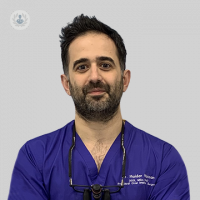What’s new with dental implantology technology?
Written by:Losing a tooth can be terrifying, but fortunately a dental implant is an effective artificial replacement that can be fitted into your jawbone to replace your missing tooth. The technology used in the procedure has evolved enormously, resulting in an aesthetically-pleasing outcome, as well as a natural-feeling, strong tooth.
Here, we talk to Dr Haidar Hassan, principal dental implant surgeon at the Swedish Smile Clinic in London, about what happens during the dental implantology procedure and how it has developed over the years to leave patients feeling confident about their smile again.

How has dental implantology technology evolved?
The technology in the field of dental implantology has evolved in the past recent years with the use of dental photography, 3D scanning and 3D printing. These have improved the accuracy of making dental restorations and implant abutments even further.
In the same manner, the use of CT scans has elevated the process of implantation as they provide a high level of detail and allow surgeons to plot the implant location precisely.
How has this improved the outcome of dental implants?
The innovation in the field has tackled many problems, including the issue of bone loss caused by missing teeth. Bone loss is very adverse, not only for your teeth, but also for the facial structure.
If a tooth is lost and it is not quickly replaced with a dental implant, over time, the bone behind it will recede and give the face a sunken appearance. Bone grafts revitalise and rejuvenate the face while providing the best possible foundation for implant treatment.
Bone grafts and soft tissue grafts are used to restore the original teeth and gums contours in a natural way. In many cases, the placement of a bone substitute biomaterial may be sufficient to acquire some bulk properties, shaping the contour of the bone and soft tissues and ultimately providing a better aesthetic outcome.
What about recent advancements in regenerative medicine and implants?
Moreover, the advances in the field have led to the introduction of regenerative medicine for implants. The use of growth factors and autologous fibrin for regenerative purposes is currently being used with remarkable results in the field of regenerative medicine, traumatology, and sports medicine.
PRF stands for Platelet Rich Fibrin. It is an advanced biotechnological therapy that uses the patient's own blood to encourage both healing and tissue regrowth after dental procedures, such as tooth extraction. Multiple therapeutic properties have been attributed to the use of PRF, with no adverse effects encountered, due to its autologous origin. The stimulation of cell proliferation and migration along with the attraction of circulating cells to the location of the injury are the basic aspects of the action of PRF. Also important is the angiogenic action of the growth factors, which is crucial to regeneration.
What happens during the procedure?
Dental implants are traditionally viewed as an invasive procedure; however, the Swedish Smile Clinic implants can be placed in a safe way and have minimal post-operative pain. The process involves:
Replacement of a single tooth:
- Firstly, the implant is surgically placed where the missing tooth was.
- The implant is then left to be healed and secured as it integrates with the surrounding bone and tissues (osseointegration).
- The second stage involves the fixing of the crown firmly onto the implant.
- The tooth will look natural and will blend with the rest of your teeth.
Replacement of multiple teeth:
- Depending on each individual case, a combination of dental implants can be used to replace multiple missing teeth without the need to replace every missing tooth with a single dental implant.
- Depending on the volume of jawbone, the implants can be placed on the same day or over a period of months.
- After a period of healing, our implants will be fully integrated and will look, feel and function like natural teeth.
Do not hesitate to book an appointment with Dr Haidar Hassan at the Swedish Smile Clinic if you would like to discuss whether dental implants are right for you.


